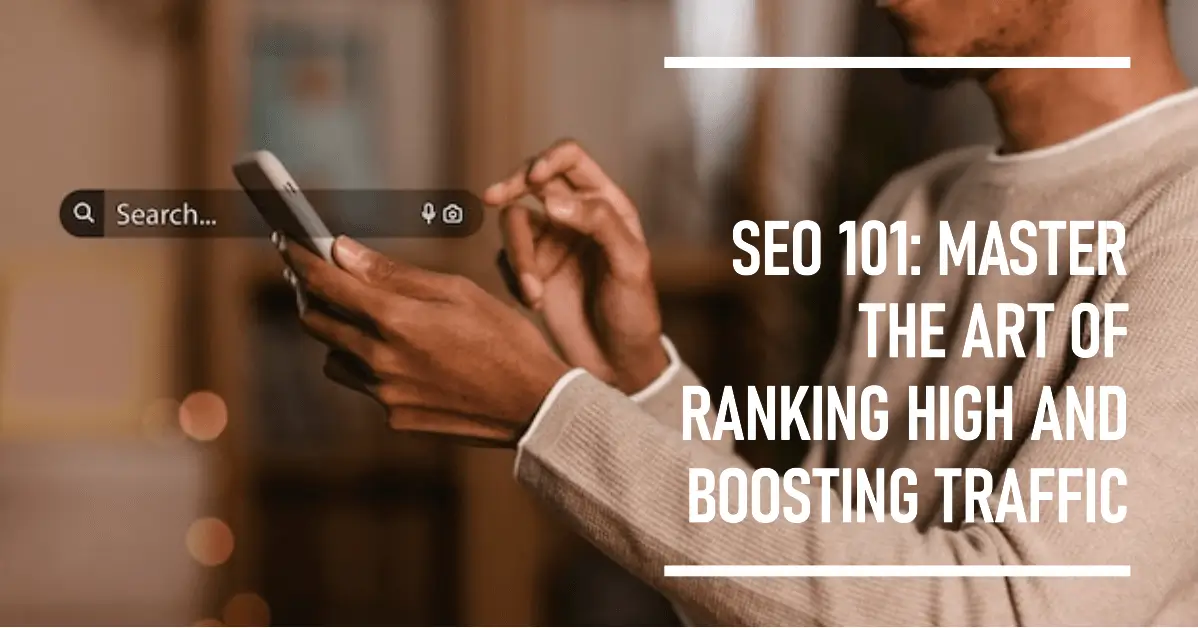SEO 101: Master the Art of Ranking High and Boosting Traffic
Unlock SEO success! Master the art of ranking high and boosting traffic with our comprehensive SEO 101 guide. Dive in now!

Do you want more traffic from Google? Rank higher and drive qualified visitors to your site with these essential SEO tips.
Did you know over 90% of website traffic comes from Google? By mastering search engine optimization (SEO), you can tap into that traffic source without spending a dime on ads.
This comprehensive guide will explain SEO in simple terms to help you boost your site's search engine rankings and visibility starting today.
Demystifying SEO - The Foundation of Online Success
What is SEO and Why Should You Care?
SEO, short for Search Engine Optimization, serves as the backbone of online visibility. In the vast digital landscape, where millions of websites compete for attention, SEO acts as your beacon, guiding users straight to your virtual doorstep.
At its core, SEO embodies the strategies and techniques employed to enhance your website's organic visibility on search engines like Google, Bing, and Yahoo.
When users type in specific keywords or phrases related to your business, effective SEO ensures that your website appears prominently in the unpaid, "organic" search results. This visibility isn't arbitrary; it's a direct result of optimizing your website's content, structure, and relevance to match user queries.
The significance of SEO goes far beyond mere rankings. It's your ticket to increased site traffic, a higher click-through rate, and ultimately, enhanced conversions. Imagine your website as a brick-and-mortar store in a bustling city. SEO is the signboard that makes your store unmissable amidst the crowd, drawing in potential customers and driving business growth.
Unlock the Power Tip: Think of SEO as your website's best friend, tirelessly working behind the scenes to make your online presence not only noticeable but irresistible to your target audience. Just like a friend who understands your needs and preferences, SEO tailors your website to match what users are actively seeking.
Let's break down the key factors for SEO success...
The SEO Blueprint - Building Your Strategy from Scratch
- Choose the Right Keywords
Keyword research is the first step in any SEO strategy. You want to identify words and phrases that prospects search for in your industry.
Focus on keywords with:
- High search volume - the most popular relevant queries. This brings more traffic potential.
- Low competition - easier to rank for versus ultra-competitive terms. Identify these "long tail" keywords.
- Good commercial intent - searches by users ready to buy or convert. Think "best lawn mower" rather than just "lawn mower."
Target keywords should be relevant to your business offerings and customer needs. The ideal balance is high search volume with low competition.
Once you identify your primary target keywords and secondary related terms, you can optimize your site around them.
Unlock the Power Tip: Use tools like Google Keyword Planner, SEMrush, and Ahrefs to unearth high-search-volume, low-competition keywords. Aim for the sweet spot where relevance meets opportunity.
Here are 11 Free SEO tools to help you improve your website’s search engine ranking.
Maximize Your Online Presence with Our Digital Marketing Agency
-
SEO: Unlock more SEO traffic and see real results with our expert optimization services.
-
Content marketing: Attract and retain customers with high-quality, engaging content that drives traffic and generates leads.
-
Social media marketing: Our team creates epic content that will get shared, get links, and attract traffic on social media platforms.
-
Google Ads: Effective paid strategies with clear ROI. Let our team help you get the most out of your ad spend.
-
Email marketing: Connect with your audience and drive conversions with targeted email campaigns.
-
Web design and development: A visually appealing and user-friendly website is key to attracting and retaining visitors. Our team can help you create a website that converts.
- Optimize Your On-Page Content
On-page SEO refers to optimizing aspects of your actual website that search engines evaluate when crawling it.
This includes:
- Page titles and meta descriptions - Craft compelling titles under 60 chars using your main keyword. Keep meta descriptions between 155-160 characters to summarize page content.
- Headers and body content - Include keywords in your H1 and H2 tags. Mention them in your content body naturally at a 1-3% density.
- Media - Insert relevant images with keyword-rich alt-text descriptions. Add videos and infographics where suitable.
- Links - Link out to authority sites from your content. Link relevant internal pages together using keywords.
On-page elements strongly influence how search engines understand and rank your content.
Unlock the Power Tip: Craft magnetic titles under 60 characters, sprinkling them with your primary keyword. Use headers (H2, H3, etc.) to structure your content, making it easy to read and digest.
Enhancing User Experience - The Key to SEO Supremacy
- Format Content for Skimmability
Blog posts, guides, and pages should be scannable. Break text into chunks using:
- Subheadings -use keywords appropriately.
- Short paragraphs - 2 to 3 sentences.
- Bulleted or numbered lists
- Bold or highlighted text
- Images and graphics
Scannable content has higher readability and engagement. Both help lift your rankings.
Use the following to improve scannability:
- Incorporate numbered or bulleted lists when listing tips, steps, features, or data points. Breaking up dense paragraphs attracts the reader's attention.
- Bold important keywords, phrases, and summary sentences that capture key ideas you want to emphasize.
- Break up text with relevant images, infographics, charts, or graphs that reinforce your points visually.
- Use short 1-3 sentence paragraphs. Single-idea paragraphs are easier to skim-read.
- Include ample headers, subheads, and whitespace to chunk information into consumable sections.
Unlock the Power Tip: Dive into the visual realm. Infographics, images, and videos not only break up text but also convey complex ideas in an instant.
- Backlink Building for Beginners
Backlinks remain one of the strongest SEO ranking factors. When reputable external sites link back to your content using your keywords, it signals quality and authority.
There are both white-hat and black-hat link-building techniques, but here are a few legitimate ways to earn authoritative backlinks:
- Contact industry websites and blogs to politely request they link to relevant content you've created. Maybe offer to reciprocate.
- Produce resources like studies, tools, or cheat sheets that sites will want to link to as a valuable asset for their readers.
- Guest post on niche sites that allow backlinks in your author bio. Avoid over-optimization.
The key is earning backlinks from high-authority sites relevant to your industry. This "link juice" gets passed to your site, boosting SEO.
Link building takes time and effort. Focus on creating amazing resources others want to share, not spamming low-quality links. High-value content earns links naturally.
Unlock the Power Tip: Engage in guest posting, collaborate with influencers, and create shareable content. Tools like Moz and Ahrefs can help you keep track of your backlink profile.
Read more: White Hat SEO vs Black Hat SEO vs. Gray Hat SEO
White Hat SEO - The Only SEO Type Your Business Needs
Technical Mastery - The Backbone of SEO Success

- Optimize Site Speed
Site speed impacts user experience and SEO rankings. Slow-loading pages lead to high bounce rates.
Use these tips to optimize:
- Compress images and media files. Large files slow page loads.
- Minify CSS, JavaScript, and HTML files. This streamlines code.
- Use a content delivery network (CDN) to cache assets.
- Defer non-critical JavaScript loading.
- Remove unused code and plugins weighing pages down.
- Upgrade to faster web hosting with SSD storage.
Test site speed with Google Google PageSpeed Insights and Pingdom Tools. Faster performance improves conversions and SEO.
Unlock the Power Tip: Compress images, minify codes, and leverage browser caching. Tools like Google PageSpeed Insights can identify areas for improvement.
- Leverage Schema Markup
Schema markup uses code to structure your content so search engines better understand your pages. This can enhance SEO and appearance in rich results. Useful schemas include:
- Article - Mark up blog posts and articles.
- FAQ - Highlight frequently asked questions and answers.
- HowTo - Outline steps for tutorials and guides.
- Product - Enhance product pages with specs, prices, etc.
- Review - Add ratings and reviews for businesses.
- Video - Improve video SEO with descriptions and embeddings.
Each schema has required and recommended data fields to insert. Adds schema markup to pages where applicable.
Unlock the Power Tip: Use schema markup to highlight crucial elements: articles, FAQs, products, and more. Structured data not only boosts SEO but also enriches your snippets in search results.
The SEO Journey - Never-Ending Learning and Growth
- Master Local SEO
For businesses with a physical location, optimizing for local SEO is critical. Follow these local SEO tips:
- Accurately complete your Google Business Profile listing with your address, hours, photos, services, etc. This powers the knowledge panel.
- Include your city, state, and keywords in page titles and content where relevant. Don't over-optimize.
- Link to your Google My Business profile on your website.
- Encourage customer reviews on Google, Facebook, Yelp, and other directories. Respond professionally.
- Register your business on industry-specific directories related to your niche.
Appearing in local pack search results and knowledge panels drives foot traffic. Ranking high locally should be a priority.
Unlock the Power Tip: Claim your Google My Business listing, encourage customer reviews, and be consistent with your NAP (Name, Address, Phone number) across all online platforms.
- Continue Learning Advanced SEO
With the basics mastered, there are always new SEO skills to learn. For continued growth, leverage these resources:
- Read SEO blogs like Moz, Ahrefs, and SearchEngineJournal to stay on top of updates.
- Explore advanced keyword research tactics including long-tail variations, LSI keywords, and semantic analysis.
- Learn technical skills like crawl budget management, site migration best practices, and e-commerce SEO strategies.
- Expand your link-building efforts through varied techniques like skyscraper content, and geographic, and influencer collaborations.
- Track SEO KPIs in Google Analytics including rankings, traffic, clicks, and conversions. Set goals and monitor progress.
- Stay up to date on Google algorithm updates and adjust your SEO approach accordingly.
Never stop improving your SEO knowledge. Combining the fundamentals with ongoing education will fuel sustainable search engine success.
Unlock the Power Tip: Explore AI-powered SEO tools like SEObility, Rank Tracker, and SEOmatic. These tools analyze top-performing content and suggest optimization strategies, saving you time and effort.
Conclusion: Your SEO Success Story Begins Here
Learning core SEO best practices is the first step for beginners. Focus on optimizing your existing on-page content, shaping information for scannability, and producing valuable resources that attract backlinks.
Gradually build your technical skills and link profile. Measure your performance using analytics. Refine and expand your approach over time.
At Tabala Digital Solutions, we understand the intricacies of SEO like no other. Our team of experts is dedicated to elevating your online presence. Whether you need assistance with keyword research, on-page optimization, or advanced SEO strategies, we have you covered.
With a thoughtful SEO strategy centered around the visitor experience, your website can ascend to the top of the SERPs in your niche.
Need help with your SEO efforts? Contact us now. We are not just another agency; we are one of the best SEO companies in Nairobi and your digital growth partners, committed to maximizing your online visibility and driving meaningful results. Boost your business with our expert SEO services in Kenya.

Strategist Profile
Abala Tom
Digital systems strategist specializing in high-performance SEO, Google Ads, and conversion optimization. Mission: to replace marketing 'guesswork' with predictable revenue systems.

